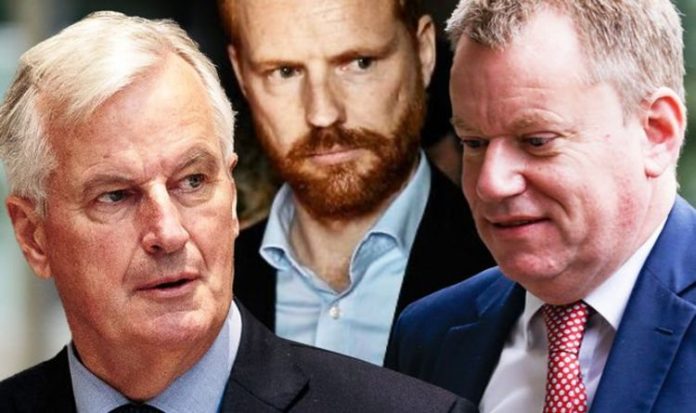Diplomats in Westminster and Brussels have entered into what is regarded as the final week of Brexit trade talks as the deadline looms. Foreign Secretary Dominic Raab said the UK was in the “last leg of negotiations” despite contentious sticking points. Fishing rights are high on the agenda.
The EU is particularly reluctant to give up its lucrative access to British waters many bloc countries have enjoyed during the UK’s membership.
Competition policy is also a major factor, with both sides reluctant to allow the other to have an unfair advantage in state intervention in business.
Despite this, Paul Embery, a trade unionist and “Blue Labour” member told Express.co.uk that a deal would almost certainly be reached at the last minute as politicians on either side look to see who crumbles under the pressure first.
He said: “In terms of the negotiations, I was a trade union official for many years.
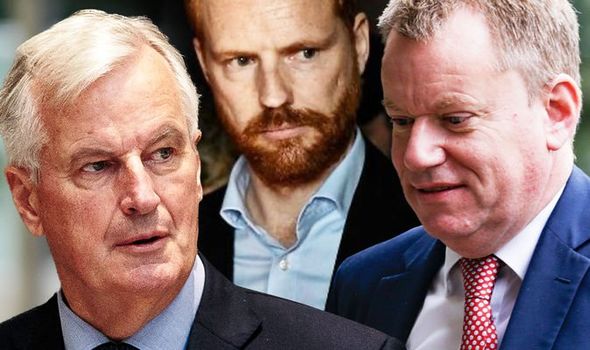
Brexit: A trade unionist told Express.co.uk that a Brexit deal will be reached at the last minute (Image: GETTY/Twitter/@PaulEmbery)
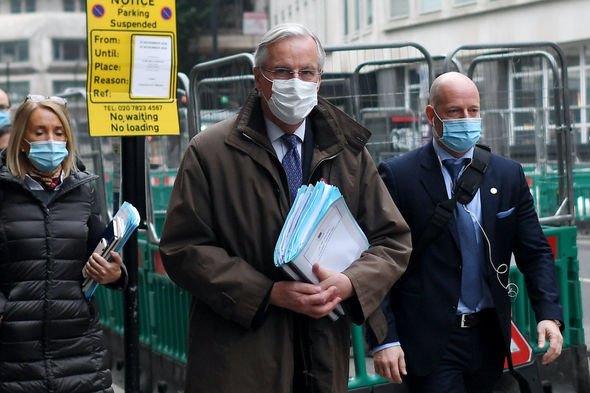
Michel Barnier: The EU’s chief negotiator resumed in-person talks this week (Image: GETTY)
“My daily life was being involved in negotiations in industrial relations and, while I’m not suggesting it was on the same scale as the Brexit negotiations, the crucial negotiations always go down to the wire.
“It’s always about posturing and eyeballing each other, it’s a game of poker that’s the truth of it.
“I suspect there will be a deal, I suspect the deal will be done quite late on, at the eleventh-hour, because I think it’s in the interests of both sides for a deal to be done.”
Talks stalled once again last week after a member of the EU negotiating team tested positive for COVID-19.
JUST IN: EU ‘crisis mode’ as Hungary and Poland accuse Brussels of ‘blackmail’
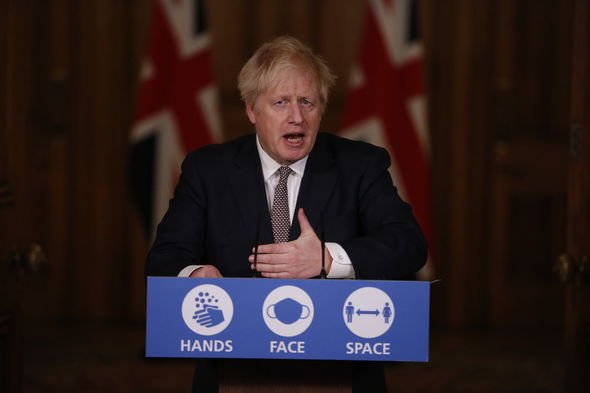
Boris Johnson: The PM has said he is confident if the UK leaves with no deal (Image: GETTY)
Negotiations continued, but via a video link rather than in person.
Much of the haggling is over how much access European fishermen will have to British waters, and how their annual catch quotas will be affected.
Currently, foreign companies own the rights to catch more than 130,000 tonnes of fish every year that are part of England’s fishing quota.
This equates to more than £160million (€177million) worth of the English quota being in the hands of vessels owned by companies based in Iceland, Spain and the Netherlands, according to reports – some 55 percent of the quota’s annual value in 2019.
DON’T MISS
George Eustice lets slip ‘possible’ Brexit deal talks may go into 2021 [REPORT]
Pound to euro exchange rate: GBP struggles amid Brexit ‘crunch’ talks [ANALYSIS]
Eustice snaps at Nick Robinson as BBC host diminishes Brexit fisheries [INSIGHT]
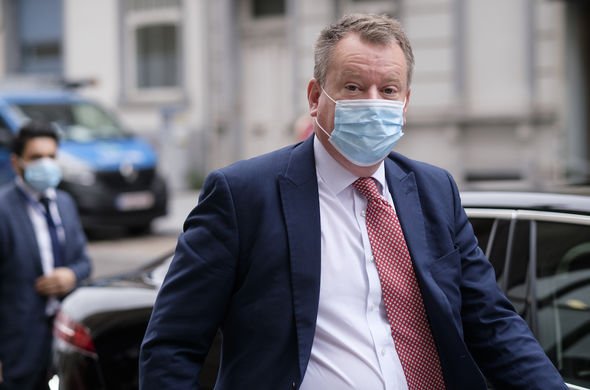
David Frost: The UK’s chief Brexit negotiator is trying to get around the issue of fishing rights (Image: GETTY)
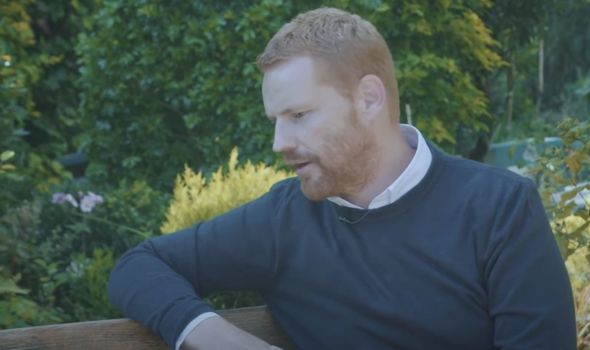
Paul Embery: The trade unionist said big-hitting deals always go to the wire (Image: Guardian/Youtube)
Speaking to the BBC’s Andrew Marr show, Mr Raab said: “We’re down to really two basic issues, but I think in particular the issue around fisheries.
“I do think this is a very significant week, the last real major week, subject to any further postponement of the goalposts in terms of the timing.”
He said that a deal was subject to the EU accepting the “point of principle” that the UK would require “control” over its fishing grounds after the transition.
He said: “If the EU understands that point of principle and we have some pragmatism, we can get there.
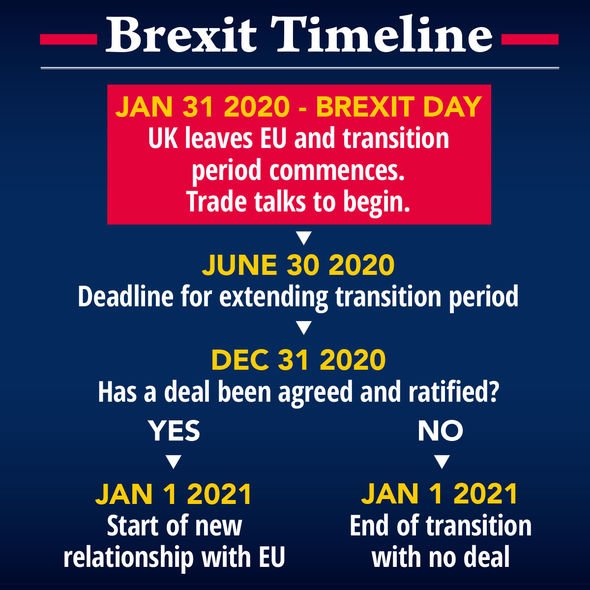
Brexit news: Should a deal fail to be agree on the UK and EU will trade on WTO terms (Image: Express Newspapers)
“We ought to be able on both sides to resolve fisheries, if you take the context of the wider economic gains and potential downsides of not having a further deal.”
Meanwhile, ahead of in-person negotiations resuming, the EU’s chief Brexit negotiator, Michel Barnier, said “same significant divergences persist” between the two sides.
While focused on fishing, the EU also appears to be worried about competition rules.
They are weary of how the two points would be enforced under a deal.
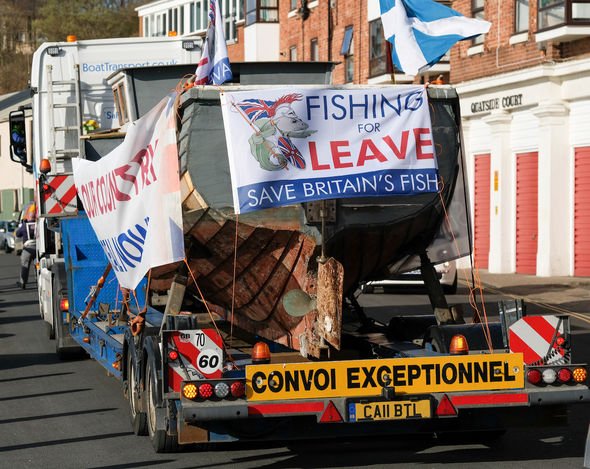
Fishing rights: Rules over fishing remain a sticking point on both sides (Image: GETTY)
Also at odds is how closely the UK should follow Brussels’ social, labour, and environmental standards after the transition.
If the UK and EU do not successfully agree on a deal, the two will trade on World Trade Organisation terms.
It would place stringent import and export tariffs on the goods of either side.
